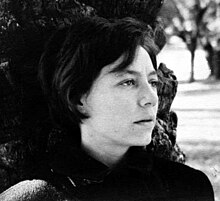You can help expand this article with text translated from the corresponding article in Spanish. (July 2024) Click [show] for important translation instructions.
|
Alejandra Pizarnik | |
|---|---|
 Photograph of Pizarnik by Sara Facio | |
| Born | Flora Pizarnik 29 April 1936 Avellaneda, Argentina |
| Died | 25 September 1972 (aged 36) Buenos Aires, Argentina |
| Resting place | La Tablada Israelite Cemetery |
| Occupation | Poet |
Flora Alejandra Pizarnik (29 April 1936 – 25 September 1972) was an Argentine poet. Her idiosyncratic and thematically introspective poetry has been considered "one of the most unusual bodies of work in Latin American literature",[1] and has been recognized and celebrated for its fixation on "the limitation of language, silence, the body, night, the nature of intimacy, madness, [and] death".[1]
Pizarnik studied philosophy at the University of Buenos Aires and worked as a writer and a literary critic for several publishers and magazines. She lived in Paris between 1960 and 1964, where she translated authors such as Antonin Artaud, Henri Michaux, Aimé Césaire and Yves Bonnefoy. She also studied history of religion and French literature at the Sorbonne. Back in Buenos Aires, Pizarnik published three of her major works: Works and Nights, Extracting the Stone of Madness, and The Musical Hell as well as a prose work titled The Bloody Countess. In 1969 she received a Guggenheim Fellowship and later, in 1971, a Fulbright Fellowship.
On 25 September 1972, she died by suicide after ingesting an overdose of secobarbital.[2] Her work has influenced generations of authors in Latin America.
- ^ a b Ferrari, Patricio (25 July 2018). "Where the Voice of Alejandra Pizarnik Was Queen". The Paris Review. Archived from the original on 2 June 2023. Retrieved 30 August 2023.
- ^ Centenera, Mar (26 September 2022). "Alejandra Pizarnik: 'I write against fear'". El País English. Archived from the original on 31 May 2023. Retrieved 10 May 2023.